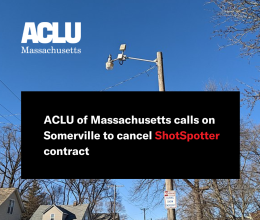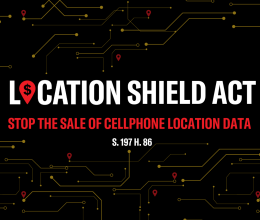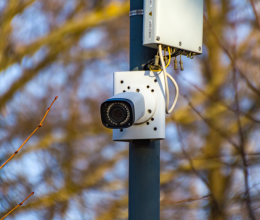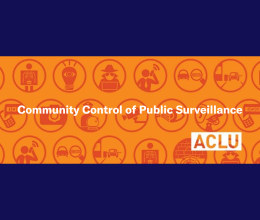
Legislation would protect against domestic abuse, stalking and harassment, and safeguard abortion access, LGBTQ people, digital privacy, and personal safety

At the Massachusetts State House, domestic violence advocates, reproductive advocacy groups, privacy and technology experts, LGBTQ+ organizations, labor unions, abortion care providers, and others are today calling on state lawmakers to ban the sale and trade of precise geolocation data.
Panelists at a hearing of the Joint Committee on Advanced Information Technology, the Internet, and Cybersecurity, dozens of advocates — including from the ACLU of Massachusetts, Jane Doe Inc., Reproductive Equity Now, Planned Parenthood Advocacy Fund of Massachusetts, the Massachusetts AFL-CIO, Transhealth, and the Jewish Alliance for Law and Social Action — are testifying in strong support of the Location Shield Act (H.86/S.197).
Our cellphones and other personal electronic devices constantly keep track of where we go. Many apps collect location information even when they are not being actively used. Location data is associated with each individual device and is therefore inherently personal information; if someone knows where a device is most nights and where it goes during the day, they know a person’s home and work addresses, and therefore that person’s identity. Third-party data brokers are allowed to buy this personal information, repackage it, and then sell it to anyone with a credit card — without any Massachusetts or federal laws to stop them.
This predatory industry puts millions of people across Massachusetts at risk. At a time of rising extremism, abuse of federal power, and unchecked corporate collusion, residents across the Commonwealth are acutely aware that their rights and lives are on the line. Privacy and freedom from surveillance are essential elements of a healthy democracy. Yet, when Americans attend protests and speak out against government policies, the location data industry puts the free exercise of their First Amendment rights in the crosshairs.
Location data poses myriad threats to our rights and personal safety. In the aftermath of the Dobbs decision, several companies have been selling detailed location data and demographic information about people who visit abortion clinics and other medical providers — including 600 Planned Parenthood locations in Massachusetts and 47 other states. Bounty hunters and other bad actors can purchase location data and use it to track, stalk, threaten, harass and even physically attack groups they dislike, or individuals singled out for abuse. Every person with a cellphone is at risk as long as this industry is allowed to continue exploiting our most sensitive personal information for profit.
The Location Shield Act, sponsored by Representative Kate Lipper-Garabedian, Representative David Vieira, and Senator Cynthia Creem, would prohibit companies from selling precise geolocation data, while still allowing them to collect and process this data for legitimate purposes with user consent. According to an ACLU/Beacon Research poll, 92 percent (92%) of Massachusetts voters support this reform. A majority of lawmakers in both chambers have cosponsored the Location Shield Act.
The following comments are from:
State Representative Kate Lipper-Garabedian (D-Melrose): “If each of us is to continue to be the protagonist of our own life, we must ensure that our state law framework protects our individual privacy so that we continue to write our narratives with autonomy. In the 21st Century, our laws must establish guardrails on the digital data we create so that we can truly exercise and enjoy the rights we have in the Commonwealth. The right to privacy is foundational for every person in the Commonwealth. We should be able to move and travel without our daily activities being monitored and monetized. And location privacy is particularly critical at a time when individual rights and entire communities are under attack at the federal level and in other states.”
State Representative David Vieira (R-East Falmouth): “Privacy is a fundamental human right that underpins our freedom of association, thought, expression, as well as freedom from discrimination. The Location Shield Act is a necessary safeguard of our right to privacy and is a fundamental value shared by Republicans and Democrats without regard for political ideology. I am hopeful my colleagues in the Massachusetts General Court will continue to expand the human right to privacy beyond the vote the Massachusetts House of Representatives took in the last session. Together, we can add these protections to state law and honor our commitment to human rights.”
State Senator Cynthia Creem (D-Newton): “Banning the sale of location data in Massachusetts will help protect our residents from bad actors attempting to use this sensitive information to target our reproductive healthcare patients and providers, as well as other vulnerable populations in our state. This bill has widespread and bipartisan support, and it is time we act on this issue to help safeguard the freedom of movement in Massachusetts."
Attorney General Andrea Campbell: “Massachusetts law currently allows an individual’s location data — which can include information about the most intimate aspects of their daily life — to be bought and sold to the highest bidder, posing serious risks to residents. I fully support the Location Shield Act, which ensures that no one's movements can be tracked and sold without their explicit consent, and I urge the Legislature to make these proposed protections law."
Carol Rose, executive director at the ACLU of Massachusetts: “At a time of rising extremism, reckless profiteering, and chaos emanating from the federal government and Silicon Valley, digital privacy and online consumer protection has never been more important. And of all the threats to our privacy and safety, the sale of precise geolocation data is one of the most pressing. Because of this predatory industry, millions of people in the Commonwealth face the risk of stalking and harassment, including domestic abuse survivors, abortion patients and providers, LGBTQ people, labor organizers, government officials, and more. We shouldn’t let bad actors track our every move. We must pass the Location Shield Act.”
Hema Sarang-Sieminski, executive director at Jane Doe Inc.: “We are witnessing, on a national scale, dynamics of power and control all too familiar for survivors of sexual and domestic violence — and we are seeing how sensitive information can be purchased or leveraged to exert and maintain that power and control. An individual’s personal location information reveals the most sensitive and intimate things about them, and everyone in the Commonwealth deserves to keep that information private. For survivors of sexual assault, domestic abuse and stalking, the privacy protections that would be enshrined by the Location Shield Act are essential to maintain safety from those who seek to track our whereabouts, maintain control, and cause harm.”
Chrissy Lynch, President of Massachusetts AFL-CIO: "Protecting against the abuse and misuse of our personal cell phone location data has become increasingly urgent. As seen with the breach of tens of millions of Americans’ data by the federal government in recent months, bad actors are already on the prowl for sensitive information from workers. Invasions of privacy have led to the persecution of and retaliation against workers for generations. As our economy continues to evolve, grow, and become more digital, it is imperative that the state takes action to protect the privacy of working people."
Rebecca Hart Holder, executive director for Reproductive Equity Now: "Digital privacy is a serious reproductive justice issue. Anyone with a credit card can buy our location information from data brokers — including anti-abortion extremists. We know for a fact that abortion clinic patients have had their location data bought and sold by these data brokers to anti-abortion extremists. We also can see bigger threats on the horizon when it comes to location data and reproductive freedom and privacy. Anti-abortion politicians have made clear that they intend to weaponize location data to crack down on patients crossing state lines for abortion care. It’s time for the Bay State to step up in this moment and protect the data that reveals where we live, work, and seek healthcare, so that Massachusetts can continue to serve as a beacon for abortion access and no one in the Bay State is targeted for exercising their right to reproductive freedom."
Dominique Lee, President and CEO at Planned Parenthood League of Massachusetts: "Because of increased fear about data sharing, many patients are opting to leave their phones at home when they come to our clinics, sacrificing their ability to call for a ride home, look up an old medical record, or update a loved one on how their appointment went. That is how scared people are of being tracked, harassed, or investigated, just for getting health care that is legal and normal. The hostility of the Trump administration toward sexual and reproductive health care makes the need for stronger data privacy laws more urgent for patients and health care providers. Passing the Location Shield Act is essential if Massachusetts wants to truly be a safe-haven state for reproductive health care.”
Jo Erwin, RN, BSN, CEO at Transhealth: “It is critical to the safety and security of the trans and gender-diverse community that Massachusetts pass legislation prohibiting the sale of location data. Allowing open access to location data puts Transhealth’s patients, their families, and us as healthcare providers in danger of harassment, violence, and potential persecution — particularly for those traveling from out of state to receive gender-affirming care that may be unavailable or even illegal in their home states.”
Cindy Rowe, president and CEO of the Jewish Alliance for Law and Social Action (JALSA): "Antisemitism, bigotry, and hate have been on the rise both in Massachusetts and nationally. Imagine a white supremacist group buying the location data for those who enter a synagogue, a mosque, or a church. Sadly, it doesn't require much imagination. With the Location Shield Act, our Legislature has the power to protect people in our state by not allowing data brokers to sell information that could be used to track us. This is the moment for Massachusetts to join with other states and keep people here from harm."
The House version of the Location Shield Act (H.86) is before the Joint Committee on Advanced Information Technology, the Internet, and Cybersecurity. The bill text also appears in the Mass Data Privacy Protection Act (H.104, S.45, S.29) also before the Advanced IT Committee. The Senate version of the Location Shield Act (S.197) is before the Joint Committee on Consumer Protection and Professional Licensure.
For more information about the Location Shield Act go to: www.aclum.org/locationshield






